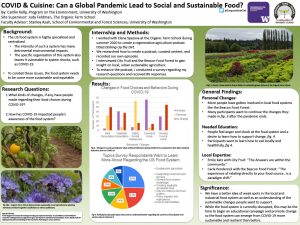Covid & Cuisine: Can a Global Pandemic Lead to Social and Sustainable Food?
The US food system is highly centralized and specialized. This industrial organization of this system not only positions agriculture as one of the leading causes of exceeded planetary boundaries, but it also leaves the supply chain vulnerable to shocks and disruptions, as demonstrated by COVID-19. The aim of this study was to analyze how COVID-19 impacts people’s food choices, evaluate their knowledge of the US food system, and ultimately compile key points to address in an agricultural podcast. The goal of the podcast is to promote a sustainable and equitable food system for producers and consumers through educational outreach. The base of my internship was the creation of the podcast itself, curated topics, and a few relevant interviews in my own completed episode. The research to support the podcast was a survey of people’s food behaviors and system knowledge before, during, and anticipated after the COVID-19 pandemic. The survey showed that during the pandemic, meat consumption and eating food from restaurants decreased while vegetable consumption, gardening, and cooking at home increased. Respondents overall expressed concern about the ethical treatment of farmworkers, the accessibility of healthy food, and had a desire to learn how to support local agriculture and eat more healthfully than they did pre-pandemic. All of this information gives the podcast focus and direction to create content that is highly relevant and informative for listeners and confirms that there is already a desire within the community to learn how to create a more social and sustainable food system.
